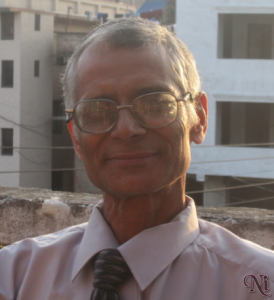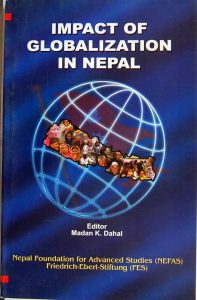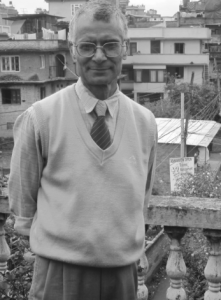Professor Dr. Ram K. Dahal
Tribhuvan University, Nepal
Introduction:
The worldwide waves of democratization, globalization, privatization, liberalization, mercerization and individualization have exercised a powerful influence on the life of the Third World countries. Their impacts have become so deeply rooted that they have created a lot of challenges to the society. The international economic system is rapidly marching towards remarkable “integrative changes, accelerating instability, insecurity and massive human problems”. The rich are getting richer; the poorer ones poorer and the middle classes in many countries are losing ground. The people in the Fourth World (the poorest of the least developed countries) are facing numerous problems plaguing their economic systems. The nation-states, in spite of their continuous efforts, have started realizing that the solutions to these challenges created by globalization’ may not necessarily lie in their constitutional order. The conceptual and political changes brought by it have led to redefine their traditional notions of state, sovereignty, government, legitimacy in governing people and an associational revolution of non-state forces.
This paper is divided into three parts. The first part addresses the notion of globalization. The second part deals with Nepal’s experiences with its underlying process; and the final part concentrates mainly on the impact of globalization on Nepalese polity, particularly dealing with its influence on both state and non-state actors state, government, political parties, interest groups, citizens, and bureaucracy.
Globalism: Concept and Context:
Globalization is a worldwide phenomenon and has become quite a fashionable term which means free flow of ideas, goods, and services throughout the world. It is closely associated with a number of policies-privatization, liberalization, denationalization, marketization and deregulation. The most critical components of globalization- economy. ideology, technology, culture and information- operate independent of the control of nation-state. The International system of the twentyfirst century would be characterized by a seeming contradiction: fragmentation, on the one hand, and growing globalization, on the other (Kissinger, 1994: 806; Baral, 1997). The process of globalization is considered as “the process of consolidating wealth and power by the rapid integration and structuring of national economies into one global economic order through trade liberalization, privatization and deregulation. The aim is to remove the obstacles to the global movement of capital and production of goods that have accumulated in advanced, industrial capitalist countries. It is characterized by the accumulation of surplus capital in the form of private profit, the presence of monopolies, concentrating and centralizing capita; the merging of finance and capital; the dividing of the world into markets; the global movement of and speculation in capital and the collusion with and using national and international institutions to consolidate power. “It is also closely associated with” dramatic disparities in wealth and income within and between nations; intensification of exploitation and oppression of labor; use of high electronic technology; widespread influence of mass media; changes in means of transport; revolution in bio technology and multinational corporations supported by new supranational institutions” (Women’s International League for Peace and Freedom, 1997: 5 -6).
Telecommunications and jet travel have created “global village” and burgeoning social and economic transactions are creating “a world without borders” (Brown, 1972). World politics in to-day’s era of interdependence is fast changing. “Old international patterns are gradually crumbling; old solutions are fast unavailing and old slogans are uninstructive. To-day’s world has become interdependent in economics, in communications, in human aspirations and so on” (Viotti and Kauppi, 1990: 379). The territorial state of to-day’s world is being eclipsed by various non-territorial actors such as transnational or multinational corporations (MNCs), transnational movements (e. g. human rights and so on) and international Organizations and financial institutions. The modern state “has become a single economic unit ( Kindleberger, 1972: 207). What does it mean for politics? Obviously, it is something that cannot be answered in advance.
The “complex interdependence” in to-day’s changing world politics is characterized by linkages, strategies or multi-channels connecting societies; absence of hierarchy among issues or agenda setting and minor role of military force” (Viotti and Kauppi, 1990: 384). The role of MNCs or transnational, trans-govemmental and international organizations have become particularly important in the changing political processes of “complex interdependence.” The MCs might be significant both as “independent actors and as instruments to be manipulated by governments.” The multiple channels of contact generally found in the “complex interdependence” cover non-governmental actors, financial institutions, governmental bureaucracies, trans-governmental coalitions, and international institutions. International organizations in particular are supposed to be congenial institutions for the weak states.
The “one state one vote” norm of the UN system particularly creates background for togetherness and closeness for the small and the powerless. Most of the international organizations insist on socio-economic equity and the equality of states; “generally set agendas; induce coalitions – formation and act as arenas for political action by weak states.” It is generally believed that the ability to choose the organizational forum for an issue and to mobilize votes will be an important political source (Keohane and Nye quoted in Viotti and Kauppi 1990: 379 -97). Does it mean that globalization helps the smaller states in internationalizing their identity and solving the problems faced by them collectively? It mainly focuses on the importance of economy, especially capitalist relations of dominance or exploitation, to an understanding of existing global politics. The globalist viewpoint is mostly influenced by Marxist analyses of exploitative relations, but all the globalists are not necessarily Marxist.
Dependency Theory, whether understood in Marxist or non-Marxist terms, is generally categorized as part of the globalist thinking. International relations can be better understood if they are studied as occurring within a world capitalist system (Viotti and Kauppi, 1990: 591). This suggests that globalization denotes nothing but the universalization of capitalism.

For the globalists, it is necessary to understand the global context within which nation-states and other institutions interact. “In order to explain behavior at any and all levels of analysis – the individual, bureaucratic, societal and states the overall structure of the global system would be the International system.” Moreover, historical analysis is important in explaining and predicting international system in holistic sense. In the existing international system particular mechanisms of domination that exist “precludes the Third World Countries from developing” and that contributes to “worldwide uneven development”. In explaining the position and functioning of the Third World countries to a subordinate position, economic factors are absolutely critical. The capitalist mode of production and internal relations grounded in political economy cover other aspects of the picture. The distinction of “high politics” versus “low politics” is rejected in terms of the relative importance of economic as compared to political- military factors. They are attuned to events, processes, institutions and actors operating both within and between states. “The globalists prefer to write in the transnationalist tradition emphasizing socio- economic or welfare issues; are concerned with the welfare of the least developed countries (LDCs) and have low faith in the possibility of peaceful change.” The hierarchical nature of world politics with the South being subordinated to the North and the economic dictates of the world capitalist system make it unlikely that the northern industrialized states would make any meaningful and important concessions to the Third World countries. For the globalists, change, whether peaceful or revolutionary, is problematic (Viotti and Kauppi, 1990, 399- 402). Economic exploitation and suppression are integral parts of the world capitalist system. The central players in establishing and maintaining dependency theories are the MNCs. The MNCs and the Banks, for the globalists of Marxist persuasion, “are agents par excellence of the critical means by which Third World states are maintained in their subordinate position within the world capitalist economy” (Viotti and Kauppi, 1990: 400).
In the world capitalist system, the international financial institutions–the World Bank, International Monetary Fund (IMF), and World Trade Organization (WTO)-play a crucial role. The Multi National Corporations (MNCs), Trans governmental organizations (TGOs) the NGOs and INGOs have also become the strongest and most trusted vehicles of globalization. The phenomenon of globalization is defined as an “increase in cross-border economic interdependence resulting from a greater mobility of factors of production and of goods and a service has established linkages over a broad geography of location. This trend is reflective of an increasing economic liberalization and falling tariff barriers, modern communications, freer how of capital and technology, integrated financial markets and corporate strategies of multi-national companies that operate on the premises of a homogeneous world market.”
The international capitalist system, often considered as new imperialism by the Third World countries, operates in its own way and style upe new imperialism is the construction of a new global system The sirated by the group of seven, the International Monetary Fund (ME), or World Bank (WB) and the General Agreement on Tariffs and Trade (now renamed the World Trade Organization: WTO). The new global economic svstem operates through a system of indirect rule which has involved the integration of leaders of developing countries into the network of the new ruling elites. These countries can receive cheap and large amount of loans is they adopt the programs embodied in the orthodoxy of balanced budgets, a hearty welcome for foreign capital investment, devaluation, privatization and liberalization of their economies. The evolution of structural adjustment programmes (SAPs) has involved the total integration of the IMF and World Bank into the life of the target countries” (Financial Times, April 25-26, 1992; Bruin, 1996: 3). The huge deposits of Middle Eastern petro dollars (particularly after the oil prices rose since the fourth Arab-Israeli conflicts in 1973) and higher deposits from most of the industrialized nations had empowered the Bretton Woods and other financial institutions to begin their lending throughout the world. Their supporters mostly influence politicians and the WTO to adopt policies friendly to corporate interests even though they might be harmful to the environment and human beings at large and contribution to election campaigns in most of the countries directly or indirectly has made this kind of lobbying successful to some extent (Bruin, 1996: 4).

The BWIs had imposed new policies and conditions on most of the indebted countries in the early 1980s when the latter failed to repay the foreign debts. These policies are popularly known as the Structural Adjustment Programs (SAP) involving strict conditionalities and “austerity measures” which intend to generate foreign exchange so that the countries could pay the foreign debts. Moreover, these were implemented as a precondition for receiving further financial assistance. Their objective is “to improve the nation’s foreign capital investment climate by eliminating trade and investment regulations; reducing government’s deficits by cutting unnecessary expenditures and boosting foreign exchange earnings through the promotion of exports and reduction of imports, currency devaluation, privatization of government –owned enterprises, trade liberalization; massive lay-offs in the public sectors and wage liberalization (Bruin , 1997:6).
In most Afro-Asian Countries, SAP and other such related programs, instead of contributing to a country’s Capacity to develop, have in fact caused several negative impacts and led to a net transfer of resources from indebted countries to the governments, financial institutions, corporations and banks of the North. They have also accelerated the globalization process by which almost all countries are integrated into the global system of capitalist relations and production and distribution methods leading to economic bankruptcy in most Third World countries. They have also benefited big business instead of benefiting the poor people: The transfer of resources from the South to the North during 1982-1990 has shown that they had benefited banks and the penetration of Third World economies by transnational corporations (TNCs) and the big companies of the North. In spite of these hardships, the SAPs are still reported to have been implemented in more than ninety Third World countries, Eastern Europe and the former Soviet Union (Bruin, 1997, 6-7).
The SAPs are also responsible for the worsening living conditions in many countries causing several protest movements, social explosions and popular protests most of which are often met with military force and repression.
Anti- IMF riots have occurred in more than 20 countries causing at least 4,000 deaths, up to 10,000 wounded and thousands more imprisoned for protesting against price increases and lack of access to education, land, wood, food, health care and housing (George, 1992; Bruin, 1996). Due to the impractical policies of the unjust international economic system, the world is heading towards terribly difficult problems. People in all parts of the world are fighting for an equitable society based on the satisfaction of human needs and public welfare. The SAPs instead of respecting human rights have resulted into violations, particularly of the economic, social and cultural rights and right to development, right to work, social security, health care, housing, food and education. The “social safety network” programs introduced by the SAP to compensate for the misery have also left the majority of the population out of the process. But the World Bank and the IMF have defended their policies by stressing special economic and social programs focusing on the gender sensitivity ’empowerment of women’, strengthening social capital, and public participation. The public is being mesmerized into believing that there is no other way to develop except through the twin engines of “free market” and “free trade”. This is the mainstream ideology Currently dominating the new world order (Ed Tadamn t995: 3). If this is the case, what scope does it leave for democracy and human rights?
“The Uruguay Round had made the world safe “for outward looking regionalism (Kelsey, 1995: 17). The globalization process is thus associated with state minimalism, export promotion, replacement of closeness by openness: introduction of delicencing system and a number of liberal economic reforms. The imposition of western values and culture is also associated with it. For the nationalists and communists of the Third World in is a powerful force of imperialism; the means of exploitation. Its supporters prefer to relate it with universal democratization, privatization and liberalization. It can be viewed through different approaches. The Third World countries have thus become the consumers of globalization, bearing and sharing both the burdens and benefits of the process.
As the liberalist doctrine views it, the system of free competition, regarding public sector, development and democracy could come into existence and function in so far as the functions of the state are kept within the narrowest limits and such is the ideal way to secure the equilibrium in the society. The slogan of “less state, more private enterprise,” advocated by the neoliberals” and the slogan “less state, more people” raised by representatives of neoliberalism in Turkey,” reflect that private enterprise is identical with democracy or that it is a precondition of democracy. “In the world of multinationals, the assertion that the alternative to the state is the people or the alternative to the public sector is the economic initiatives under the control of the people has become much less convincing.”We have entered a new era of empire building based on the unconditional hegemony of international capital or global totalitarianisms” (Isikli, 1998: 7).
End text.
Text courtesy: “Impact of Globalization in Nepal”-a book published by Nepal Foundation for Advanced Studies ( NEFAS), 2005 and edited by late Professor Madan Kumar Dahal.
-With due permission received from the NEFAS authorities.
# # Our contact email address is: editor.telegraphnepal@gmail.com
-Shortly to begin with: “Nepal’s Experiences in the Process of Globalization”.
